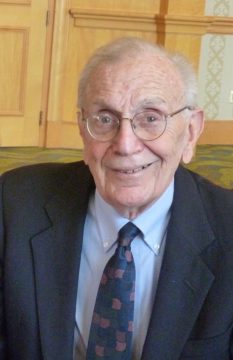Joseph Willard Inselburg, MD, professor emeritus of microbiology and immunology at Geisel School of Medicine, died February 29. He was 82 years old. His research career at Dartmouth’s medical school spanned 34 years.
"It's always hard to lose someone who meant so much to our scientific community—especially someone who had a very strong and positive influence on his colleagues," says Geisel Dean Duane Compton, PhD.

“Joe’s presence in microbiology, alongside Elmer Pfefferkorn, led to the recruitment and establishment of an outstanding parasitology group in the department, including David Bzik, PhD, Joe Schwartzman, MD, and Lloyd Kasper, MD,” says David Leib, PhD, chair of microbiology and immunology. “His groundbreaking work on the molecular biology of Plasmodium falciparum has led to a number of important advances including a malaria vaccine currently in phase 2 clinical trials.”
Bzik describes his former colleague as an incredibly bright and talented teacher, researcher, and scholar. “Joe was the first to (1) demonstrate that asexual forms of the malaria parasite when released from infected red cells will either continue asexual replication or commit to developing into sexual stage gametocytes, the first to (2) isolate drug resistant mutants and artemisinin resistant mutants of malaria two decades before this was recognized as a major problem in malaria treatment, the first to (3) characterize the malaria parasite DHFR-TS gene and enzyme and identify the mutations in malaria DHFR that conferred resistance against pyrimethamine which was the front line malaria treatment, and the first to (4) develop and characterize monoclonal antibodies against the malaria parasite that prevented the growth of malaria.
“He accomplished all of these feats within his first five years of working on malaria after more than a decade of previous research on colicins and drug resistance in bacteria. This is all the more remarkable in view that Inselburg’s malaria lab was at Dartmouth, and at the time was the only NIH funded research lab that was not in a large urban center or major government research center. The gene and protein target (called SERA5) of one of the malaria parasite inhibitory monoclonal antibodies that Joe’s lab identified in the 1980’s is now in Phase 1b clinical trials in West Africa after showing greater than 72 percent protective efficacy in initial clinical trials in children,” Bzik says.
His good friend and colleague, Azizul Haque, PhD, adjunct professor of microbiology and immunology at Geisel, says Inselburg saw himself as a biologist and parasitologist who strived to integrate the fields of molecular biology, biochemistry, and immunology in order to contribute to scientific advances in malaria research.
Haque met Inselburg in 1992 while on sabbatical. Working in Kendall Smith’s lab—where the Dartmouth research team made several groundbreaking discoveries in the field of immunology, which brought a radical change to our understanding of the human immune system—the two scientists developed what became a lifelong friendship. Haque says Inselburg’s goal was to establish the serine repeat antigen (SERA) as a potential malaria vaccine—which he achieved.
“Professor Toshihiro Horii of Osaka University, Joe’s previous collaborator, has been continuing work to test the efficacity of SERA vaccine, which is currently in human trials in Uganda,” Haque says. “Malaria remains one of the most challenging tropical diseases causing significant morbidity and mortality. Over 40 percent of the world’s population live in malaria-endemic areas and is becoming an enormous burden on global public health.”
Randall Noelle, PhD, professor of microbiology and immunology, recalls when as a young assistant professor many decades ago he benefited from Inselberg’s guidance. “Joe was in the lab next door—a source of enthusiasm, vigor, cutting-edge vision, irreverence, and inspiration. I owe him an overwhelming mountain of gratitude for his mentoring, guidance, support, and friendship. You don’t find many like Joe.”
“I am saddened that Joe has passed away,” Haque says. “He was an open-minded person with generosity and thoughtfulness. A poet and an avid tennis player, he was often one of my tennis partners. Whenever I met him, he always had a very welcoming smile on his face. His dedication to science for the good of human beings is commendable—this was one of the reasons that he had started to work on malaria—we had many insightful discussions about science and social justice. I will miss you Joe.”
Bzik shares a similar memory. “What I will always remember about Joe was his passion and commitment to human rights and those most in need. This commitment guided Joe’s research path and his personal life. The Inselburg lab was guarded by a huge Amnesty International poster that you had to navigate before you could chat with him.”
To honor his passion and dedication to social justice, donations can be made in memory of Dr. Joseph Willard Inselburg of Hanover, New Hampshire, to Doctors Without Borders, Habitat International, or Amnesty International.